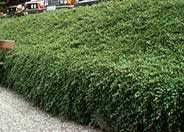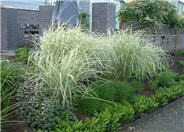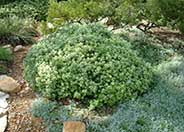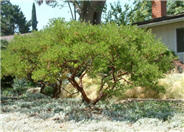
Common name:Bearberry Cotoneaster
Botanical name:Cotoneaster dammeri
This prostrate, trailing evergreen shrub is primarily used as a ground cover. It is highlighted with bright green, ovate to rounded leaves with prominent veins. In the fall, Bearberry Cotoneasters are accented by small, bright red berries.

Common name:Allan Bloom Hybrd
Botanical name:Achillea 'Moonshine'
Long, straight stems with pale yellow flowers are apparent on the mats of green to grey-green leaves of this plant, which are flatter and less divided than those of the Achillea millefolium.
The yarrow propagate easily from rooted cuttings or division, which should be performed in the early spring or fall. Following bloom, one should dead head the plant and divide the clumps when it appears crowded.

Common name:Variegated Japanese Silver Grass
Botanical name:Miscanthus sinensis 'Variegatus'
This tall, mounding grass will grow to about 6' high and has seasonally deciduous, greenish white, variegated leaves. Tall grasses are highly combustible.

Common name:Compact Karo
Botanical name:Pittosporum crassifolium 'Compactum'
Pittosporum crassifolium 'Nana' is an evergreen shrub or tree. It can reach 25' tall and 20' wide in 8-10 years. Branches are densely clothed in gray green, with 1"-2" long leaves that have rounded ends. It produces maroon flowers in late spring.

Common name:Howard McMinn Manzanita
Botanical name:Arctostaphylos densiflora 'Howard McMinn
This shrub is highly appreciated for its decorative characteristics, which include a dense show of small, pale pink urn-shaped flowers. Above all, it is the mahogany-red to brown bark (which peels beautifully) that is the major attraction. Its fruit resembles the tike apple, and the flowers contrast perfectly to the light green leaf (which can get rather tough). It blooms from late winter to spring.
Designer: Carol Bornstein
Photographer: GardenSoft
Maintain a two to four inch layer of mulch on the soil surface to reduce weeds, infiltrate rain water, and reduce compaction.
Develop healthy soil for plants that are vigorous and naturally pest-resistant.